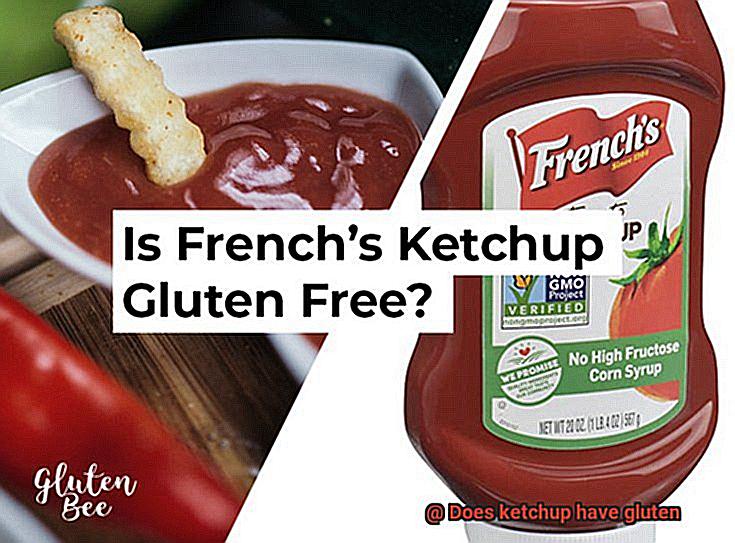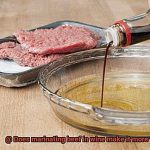Are you a foodie who loves to experiment with new and exciting flavors? Do you also happen to be someone who needs to follow a strict gluten-free diet? If so, you may have found yourself pondering: does ketchup contain gluten?
Gluten is a sneaky protein that lurks in many grains, including wheat, barley, and rye. For those with celiac disease or non-celiac gluten sensitivity, even the tiniest trace of gluten in their food can wreak havoc on their health.
Ketchup, the beloved condiment that elevates everything from burgers and hot dogs to fries and eggs, is a staple in many households. But is it safe for those who need to avoid gluten?
The answer isn’t as clear-cut as you might assume. While conventional ketchup recipes don’t typically include gluten-containing ingredients, some brands may add gluten as a thickening agent. Furthermore, cross-contamination can occur during the manufacturing process, making even supposedly gluten-free ketchup potentially hazardous for some individuals.
In this blog post, we’ll delve deeper into the question of whether ketchup has gluten and explore some mouthwatering alternatives for those following a gluten-free lifestyle. So grab your favorite condiment (gluten-free or not.), sit back, and let’s dig in.
Contents
What is Gluten?
Gluten – a protein found in wheat, barley, and rye – is a crucial ingredient that gives dough its elasticity and helps it rise. It’s no surprise that gluten is commonly found in bread, pasta, and cereal. However, gluten can also be found in less obvious foods like soups, sauces, and condiments such as ketchup.
Unfortunately, consuming gluten can cause serious health problems for people with celiac disease or gluten intolerance. When individuals with celiac disease consume gluten, their immune system attacks the small intestine, damaging the lining and causing inflammation. This can lead to malabsorption of nutrients and other health problems. Non-celiac gluten sensitivity also causes similar symptoms when individuals consume gluten.
To ensure that their food is gluten-free, individuals with celiac disease or gluten intolerance need to carefully read food labels. They should check the ingredients list for wheat, barley, or rye as well as cross-contamination during processing. For instance, ketchup may contain malt vinegar or wheat starch that could potentially contain gluten.
While most brands of ketchup do not contain gluten as their main ingredients are tomatoes, vinegar, sugar, and spices which are all gluten-free, some brands may add wheat-based thickeners or malt vinegar. To guarantee a gluten-free ketchup option, individuals should look for “gluten-free” or “certified gluten-free” labels by reputable agencies.
Cross-contamination risks also exist when using condiments like ketchup. If a gluten-containing food item has come into contact with the ketchup bottle or spoon, there is a risk of gluten contamination. To prevent this from happening, consider using squeeze bottles or individual portion packets of ketchup.
Does Ketchup Contain Gluten?
The basic ingredients of ketchup, such as tomato paste, vinegar, sugar, and spices, are all naturally free from gluten. However, as with any processed food, there’s always a chance that sneaky gluten could be added in the form of additives or fillers.
To ensure that your ketchup is gluten-free, here are a few tips to keep in mind:
- Read labels carefully and look for any ingredients that may contain gluten, such as wheat, barley, or rye. If these are listed, it’s best to avoid that brand altogether.
- Don’t hesitate to contact the manufacturer directly to ask about their gluten-free status. This way, you can be sure that you’re making an informed decision.
- Some people with celiac disease or gluten intolerance may have a sensitivity to vinegar, which is a common ingredient in ketchup. In these cases, it’s best to look for a brand that uses a different type of vinegar, such as apple cider vinegar.
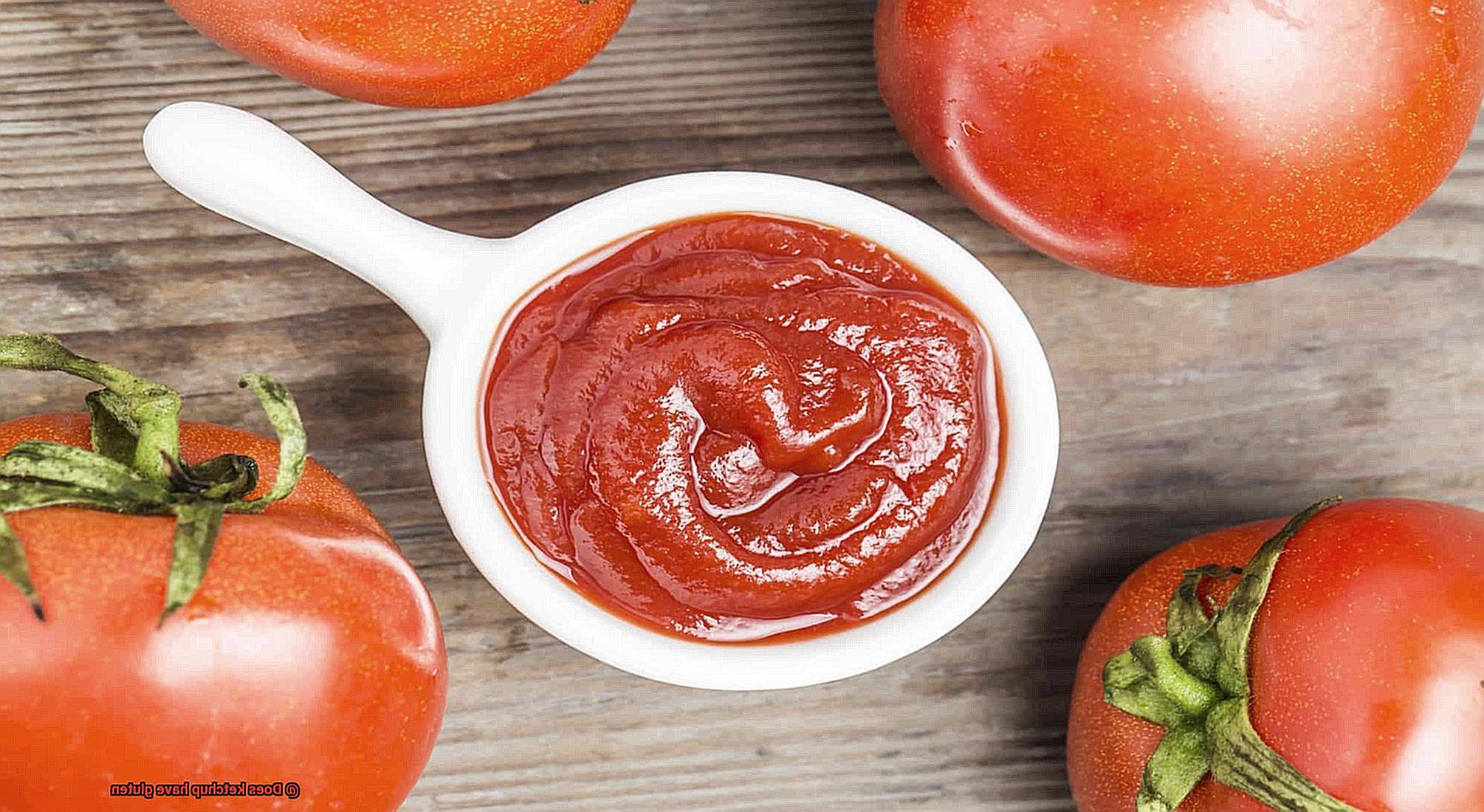
It’s important to note that even though ketchup itself may be gluten-free, it’s often used as a condiment on foods that do contain gluten – like burgers and hotdogs with buns made from wheat flour. So double-check the other components of your meal before taking a bite.
Ingredients in Ketchup that May Contain Gluten
As an expert in the ingredients in ketchup that may contain gluten, I’m here to guide you through this condiment conundrum.
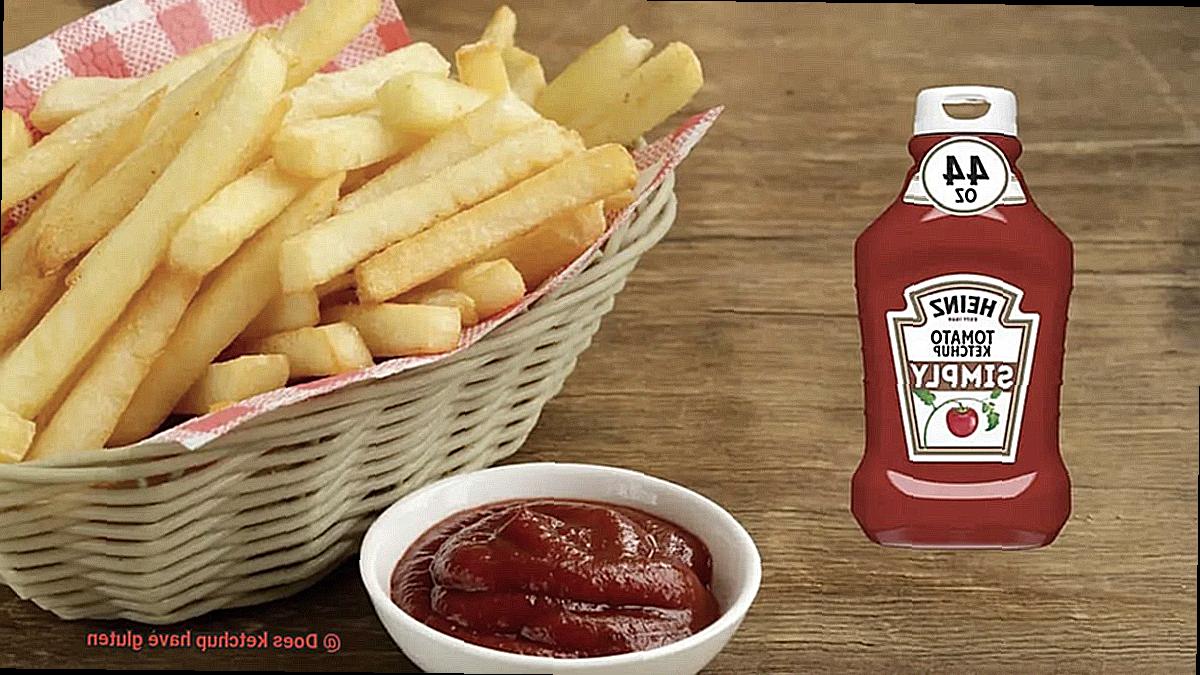
First and foremost, let’s clear the air. Most ketchups are free from gluten and safe to consume. However, there are exceptions, and it’s essential to read labels carefully to ensure that there are no hidden sources of gluten. Here are the top three ingredients in ketchup that may contain gluten:
- Malt vinegar: This acidic flavoring agent is used in some ketchup brands but is made from barley, which contains gluten. If you’re gluten-sensitive, it’s crucial to avoid ketchup with malt vinegar. Look for brands that use distilled vinegar instead.
- Wheat flour: Some ketchup recipes use wheat flour as a thickener. Unfortunately, this ingredient is a no-go for those with celiac disease or a gluten sensitivity. Be sure to look for brands that use alternative thickeners such as cornstarch or xanthan gum.
- Soy sauce: A few manufacturers may add soy sauce to their ketchup recipe. Soy sauce typically contains wheat as an ingredient, making it unsuitable for those with gluten sensitivities or celiac disease. Be sure to read the ingredient labels carefully and choose brands that don’t use soy sauce.
Now that we know which ingredients to watch out for let’s explore some delicious gluten-free ketchup options. Many brands offer gluten-free varieties of their classic ketchup, so be sure to read labels and do your research before purchasing. Plus, making your own gluten-free ketchup at home is easy and fun.
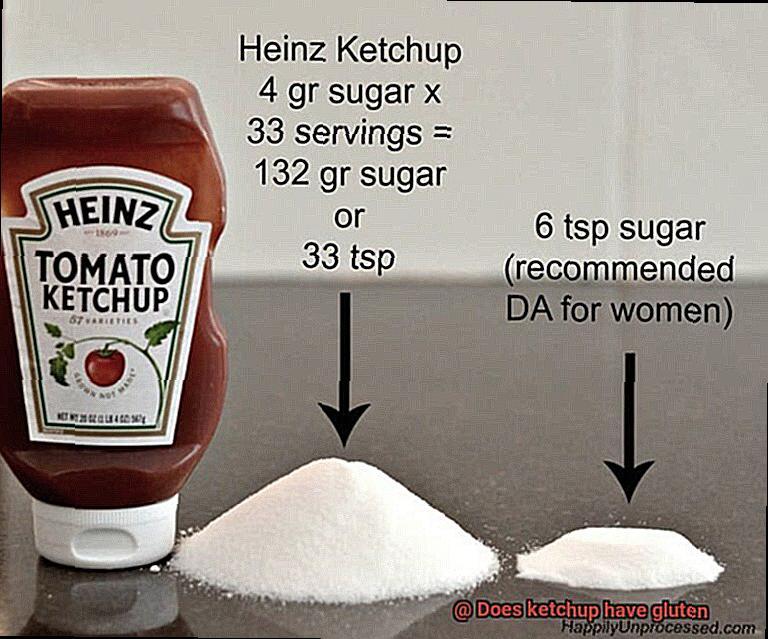
Here’s a simple recipe for homemade gluten-free ketchup using tomato paste, apple cider vinegar, honey, and spices:
- 1 can (6 ounces) tomato paste
- ¼ cup apple cider vinegar
- 2 tablespoons honey
- 1 teaspoon onion powder
- 1 teaspoon garlic powder
- ½ teaspoon salt
- ¼ teaspoon black pepper
- Water, as needed to thin
How to Find a Gluten-Free Ketchup
Here are five ways to help you find a gluten-free ketchup that satisfies your cravings.
Label Check
The first step in finding a gluten-free ketchup is to check the label. Look for ketchup that specifically states “gluten-free” on the label. If the label does not mention gluten, check the ingredient list for any gluten-containing ingredients such as wheat, barley, or rye.
Keep in mind that some brands may use different terms for gluten, such as “wheat protein” or “malt extract,” so be sure to read the label thoroughly.
Cross-Contamination Risks
When it comes to using condiments like ketchup, cross-contamination can occur if the bottle or spoon comes into contact with gluten-containing foods or surfaces. To avoid this, consider using squeeze bottles or individual portion packets of ketchup.
Additionally, look for ketchup that is produced in a facility that is dedicated gluten-free or has strict protocols in place to prevent cross-contamination.
Ingredient List
Many ketchups contain modified food starch, which is often made from wheat and can contain gluten. Additionally, some ketchups may contain barley malt vinegar, another source of gluten.
To ensure that you are purchasing a gluten-free ketchup, it’s best to read the ingredient label carefully. Some popular brands that offer gluten-free ketchup options include Heinz, Hunt’s, and Annie’s.
Homemade Ketchup
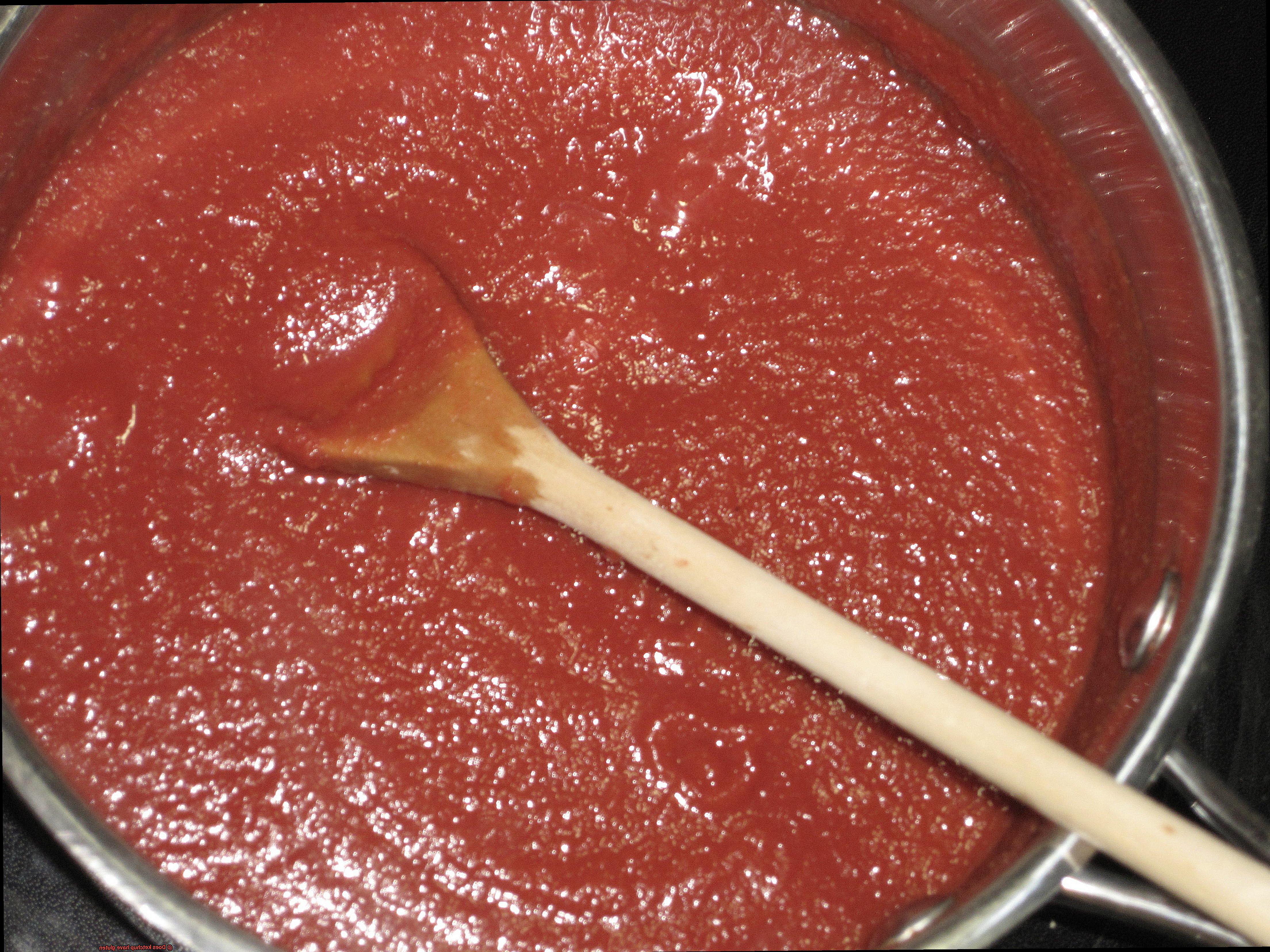
If you prefer to make your own condiments at home, making your own gluten-free ketchup is easier than you might think.
Simply mix tomato paste, vinegar (such as apple cider vinegar), sweetener (such as honey or maple syrup), and spices (such as garlic powder and onion powder) to taste. This allows you to customize the flavor and ensure that it is completely free of gluten.
Dining Out
When dining out, don’t be afraid to ask your server if the ketchup is gluten-free. Many restaurants now offer gluten-free options and can provide information about their condiments. If there are no gluten-free options available or if you’re unsure about cross-contamination risks, consider bringing your own individual portion packet of gluten-free ketchup.
Cross-Contamination Risks with Condiments
Condiments are a beloved addition to many meals, but they can also pose a serious risk for those with celiac disease or gluten intolerance. Cross-contamination is a major concern when it comes to condiments like ketchup. Just one slip-up can cause a gluten-free meal to become contaminated, triggering an immune response.
When it comes to condiments like ketchup, cross-contamination can occur in a variety of ways. For example, if a knife used to spread mayonnaise on a sandwich is then used to scoop ketchup out of a jar, the ketchup could become contaminated with gluten. Similarly, if someone dips a gluten-containing food item (such as a breadcrumb-coated chicken nugget) into a shared ketchup bowl, the ketchup in the bowl could become contaminated.
To minimize the risk of cross-contamination with condiments like ketchup, it’s important to take precautions. Here are some tips:
- Use separate utensils: Make sure you have separate utensils for each condiment to prevent any accidental mixing. This may seem like a no-brainer, but it’s easy to forget when you’re in the moment.
- Label gluten-free condiments: If you have multiple condiments on the table, clearly label which ones are gluten-free. This will help avoid confusion and ensure that everyone knows which condiments are safe to use.
- Educate family and guests: Don’t assume everyone knows how to properly handle condiments to avoid cross-contamination. Take the time to educate your family and guests on the risks and how to prevent them.
- Avoid shared bowls: While it may be tempting to put out a big bowl of ketchup for everyone to share, this increases the risk of cross-contamination. Instead, use individual portions or small dipping bowls for each person.
Tips for Enjoying Ketchup without Risk of Gluten Exposure
Ketchup is a staple condiment for many people, but for those with gluten sensitivity or celiac disease, it can be a source of concern. Fortunately, there are several tips and tricks you can use to enjoy ketchup without risking gluten exposure. Here are five sub-sections to consider:
Read the Label
When purchasing ketchup, always read the label carefully. Look for ketchup that is labeled as “gluten-free” or “certified gluten-free.” This will ensure that the ketchup is made with safe ingredients and produced in a gluten-free facility. Even if you have used a particular brand before, read the label every time you purchase it in case the ingredients or production process has changed.
Avoid Cross-Contamination
Cross-contamination is a significant risk when using shared condiments like ketchup. If you’re using a shared bottle of ketchup, make sure to clean the nozzle thoroughly before using it. Alternatively, consider using individual packets or small squeeze bottles of ketchup to avoid any potential for cross-contamination. Always use clean utensils to scoop out ketchup onto your plate, and never double-dip.
Mindful of Hidden Sources of Gluten
Some brands of ketchup may contain hidden sources of gluten, such as malt vinegar. Be sure to read the label carefully and look for any potential sources of gluten. If you’re unsure about an ingredient on the label, research it or contact the manufacturer directly to ask about its gluten content.
Contact the Manufacturer
If you’re unsure about whether or not a particular brand of ketchup is gluten-free, don’t be afraid to contact the manufacturer and ask for clarification. They can provide you with more information about their ingredients and production practices. Many companies have customer service hotlines or email addresses for questions like this.
Ask When Dining Out
If you’re dining out and unsure about the gluten content of the ketchup being served, don’t be afraid to ask your server or the kitchen staff. They should be able to provide you with information about whether their ketchup is gluten-free or not, and may even be able to offer alternative condiments if necessary. Be clear with your server about your dietary restrictions, even if it seems like a minor detail.
PJ2cW7mF9RE” >
Conclusion
To sum up, determining whether ketchup contains gluten is not as simple as it seems. Although most ketchup recipes do not contain gluten, some brands may use it as a thickening agent or utilize malt vinegar, which contains gluten since it’s made from barley. Moreover, cross-contamination during manufacturing or when using shared condiments like ketchup can pose a risk for those with celiac disease or non-celiac gluten sensitivity.
To ensure that your ketchup is free from gluten, it’s vital to scrutinize labels carefully and look for “gluten-free” or “certified gluten-free” labels by reputable organizations. You can also directly contact the manufacturer to inquire about their production practices and ingredients. Making your own homemade gluten-free ketchup using tomato paste, vinegar, sweetener, and spices is an easy and enjoyable option.
When eating out or using shared condiments such as ketchup at home, taking precautions to avoid cross-contamination is crucial. Use separate utensils for each condiment, clearly label gluten-free options, educate family and guests on proper handling techniques, and refrain from sharing bowls.

